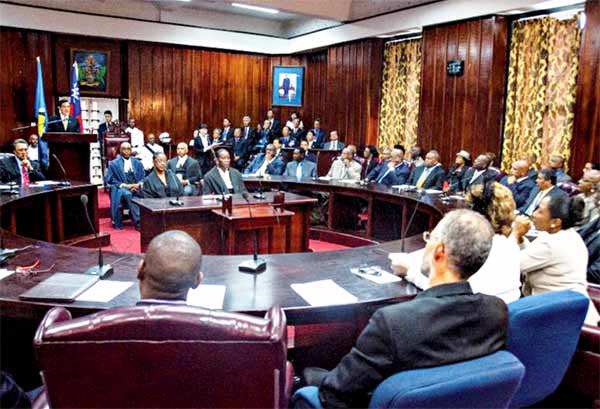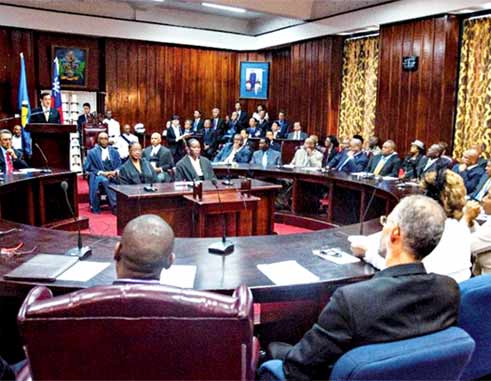
 FOR most IT and medical professionals, public speaking is merely an occasional engagement that requires little panache and éclat. For business executives, by and large, it is a necessary evil to be avoided. However, for legislators and elected officials, it is a fundamental requirement of their job description; a primary tool that is the key to unlocking their personal power, character and competence.
FOR most IT and medical professionals, public speaking is merely an occasional engagement that requires little panache and éclat. For business executives, by and large, it is a necessary evil to be avoided. However, for legislators and elected officials, it is a fundamental requirement of their job description; a primary tool that is the key to unlocking their personal power, character and competence.
In the old Greek civilization, public speaking was relished as an academic discipline. Along with education, it served as an instrument of social mobility and intellectual influence; in large part, playing a pivotal role in the lives of politicians, philosophers and social leaders. Invariably, success in the courtroom, classroom, senate and parliament was a function of one’s ability to speak eloquently and articulately. Just because one could speak didn’t mean everyone would listen; individuals would have to learn the art of persuasive speaking to capture and keep the Assembly’s attention.
Even in Europe and the United States, you just have to look at political history to recognize the role erudition and articulate oratory have played in electoral success. The best politicians understood that in order to communicate work and value as well as command attention, they needed to make effective use of language and possess good delivery skills. It’s a fact that listening for a prolonged period of time is hard work; so politicians knew that in order to maintain focus, they needed to not only educate, but also arouse interest and inspire the audience. It was also well understood that the rhetorical approach to campaigning for political office had to be different from the actual debate presentation in Parliament.
Even so, Saint Lucia’s obstreperous Parliament can be both an exciting and monotonous place. Since Independence, great speakers from both parties have emerged and trod the political stage leaving indelible marks in their path. This arguably represents a period in our political history when a more discerning public took interest in parliamentary debates owing to the dynamism and educational content of such exchanges. Growing up, I remember the trenchant nature of those debates, serving as a source of education, enlightenment and self advancement for many. Of course, there were also angry passages during those parliamentary sessions which many of us, no doubt, will recall. Although some members of Parliament were better than others both educationally and oratorically, one still got the distinct impression that the culture of public speaking was alive and well, impacting society positively. I am one of those who believe that representative democracy is a great thing if it thrives on a contest of ideas and if people stay interested in it on the basis of its vibrancy and inclusivity.
At any rate, it is widely held that anti-politics is the prevailing mood of our times, perhaps due to a lack of inspiration. Parliamentary debates nowadays, insofar as opposition MPs bother to attend, are a great bore. It’s not as though the issues are not as pressing and dramatic. It’s just that some of the contributions are anything but worthwhile, raising questions about the calibre of people who avail themselves for political office. The soporific speeches, the impoverished attempts at humour, inadequate research, bad pronunciation and poor diction are hardly testament to a healthy institution. Particularly annoying is the abuse of the address form “Mr. Speaker” by members during debate presentations. At times, the nation’s lower house seems to descend to a lowly public space where members shout, jeer and hurl insults at each other. If Parliament chooses to emasculate itself in this way, it’s not surprising that people take less and less notice of it.
Lurking in the minds of Saint Lucians is the notion that the roles of members of Parliament are primarily to legislate laws and to oversee the implementation of policies by the Government, including scrutiny of public financial spending. However, you can’t adequately perform these functions if you don’t have the ability to think and speak critically and interact with the information avalanche available at any one time. Further, debate skills are critical to winning arguments, as other politicians will have opposing views.
There is a prevailing feeling that some parliamentarians generally lack the knowledge and understanding of roles, responsibilities and issues to constructively contribute in parliamentary debates. Most people will agree that there is an urgent need for some of them to hone up their polemic and argumentative skills. How can you represent people when you can’t effectively analyze policies or explain your position convincingly? Quite apart from promoting and setting good policies for the greater good of the constituents and country, the job of a parliamentarian is to advocate and argue on behalf of a particular point of view, as well as understand and respond to counterpoints. This requires quick and critical thinking skills, and a high level of presentation skills for success.
To be fair, a few parliamentarians do give a very good account of themselves in both the upper and lower chambers of the legislature. However, in a few instances, we have parochial politicians who are elected only for the purpose of providing constituency service and are unable to contribute constructively to strategic macroeconomic planning and to the nationwide building of Saint Lucia.
Will we ever be able to nurture a political and social culture that promotes intelligent and healthy debate? The signs are not encouraging, unfortunately. Take for instance our school system. Ideally, all schools by now should have had vibrant debate clubs coached by toastmasters’ volunteers. Instead of promoting inter-school SOCA competitions, we should be organizing inter-school debating competitions. Is this how we develop the minds of our young people? The promotion of debating societies would have been more productive in helping to focus more interest in debating and building an educational culture that encourages healthy discussion, non-violent communication and articulate oratory. As well as being a powerful classroom tool, debating is a fun and educational extra-curricular activity that encourages critical and creative thinking abilities. I believe the participation of students in debates is a good strategy that schools should adopt to empower young people with many important skills that adequately prepare them for adult responsibilities.
Globally, many of the great debaters and orators that have graced the political landscape actually started their journey in debating societies at school. Our own brilliant wordsmith George Odlum, took part in the Drama Society and the Debating Society at the University of Bristol. The US Secretary of State John Kerry, an expert debater who has a fundamental mastery of a wide range of issues, helped found a debating society at St. Paul’s School and was a star debater at Yale University. The New York Times reports that by the time Ted Cruz, the American Republican Senator, was a senior at Princeton University in 1992, “he had developed an arsenal of rhetorical skills and theatrical gestures that made him one of the most polished performers on the college debate circuit.” Eric Williams, Tony Blair, Bill Clinton, etc, were all exposed to debating and oratory pretty early in their school education.
The emergence of Barack Obama on the political scene should have triggered awakenings about the importance of communication and debating skills to politicians. Dean Frenkel, a vocal instructor, speech analyst, speech coach and author of “Evolution of Speech” explained: “What should our politicians learn from Mr Obama? They can start by listening to the sound-map of Mr Obama’s voice and take note of his resonance, speech manner, his adroit sense of timing and musical presentation of his voice. His speech virtues begin with a combination of accurate and crisp articulation, beautifully timed speech rate and commanding presence. He has licence and he willingly uses it. He is able to infuse passion into his speech and while he is understated, he does have remnants of speech gifts learned from preachers. Yet he never seems to over-do the passion. He often starts his sentences quite slowly then quickens up as he sifts through detail, then strategically slows his speech rate to emphasise strategic points…Mr Obama has a good mental library of words which helps him to responds well under pressure.”
Perhaps, a mandatory long-term capacity building programme would foster and equip some parliamentarians with the presentation and research skills needed to make better contributions in Parliament. With a bit more communications training, some may feel more empowered and self-confident to participate in town council exchanges and televised debates.
For comments, write to Clementwulf@hotmail.com – Clement Wulf-Soulage is a Management Economist, Published Author and Former University Lecturer.














In the great roman empire which gave rise to present western civics- borrowed from the Greek city states –
The art of DEBATE was mandatory for any career path-
IT is a fundamental CORE prerequisite for the practice of modern democratic principles.
The absence of constructive debate among black folks allows the shame of our humiliating slave experience to pervade , nay, haunt us to hatred amongst each other…
oops did I omit that the Great Greeks who made the Great Rome of Augustus and Julius et al got their learned resources from AFRICA
Yes siree AFRICA
Why when the invincible Afrika Korps of Field Marshall Rommel-(Fall of Tobruk)
fell to the less mechanized British forces at el Alamein-
had a domino effect on the Euro theater of operations via the Italian Peninsula.
Maybe the great Hannibal left a battle plan?
Or the great civilized Moors left their strategies in the libraries of Seville?
Either way AFRICA has been a potent force in the education of Europe.
Gratitude is a b*tch!
My biggest pet peeve in the black communities is not the N word ( because I realise it is an oath that attests / affirms our self hating catharsis)
-instead it is the phrase “shut the f**k up!’
Mother-son Father-daughter no matter /black folks do not want to listen to each other-
except for the daily gossip/smut/ bovine manure swirling on the grapevine.
What truly matters we have no fortitude nor patience to tolerate.
The great challenge to St LUCIA IS to introspect on our past and journeys to the present then talk to each other as to the impact of our historical legacy.
Shall we be objective thru rose colored spectacles or fear the glaring truth of our Euro past. Perhaps like Africa of Antiquity we can help retool Europe with a more god fearing intellect. May, the Supreme Divine God rule our world- amen